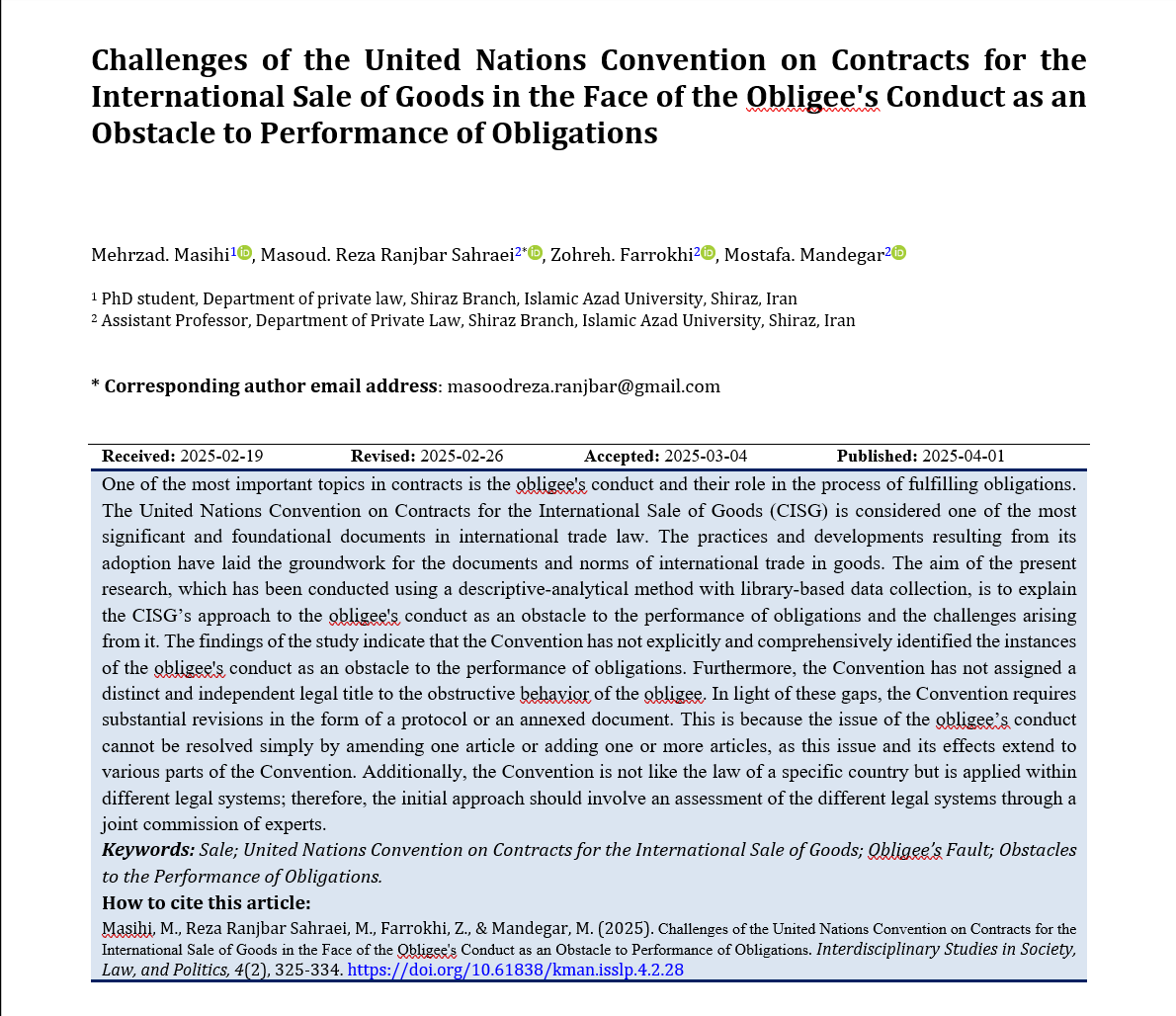Challenges of the United Nations Convention on Contracts for the International Sale of Goods in the Face of the Obligee's Conduct as an Obstacle to Performance of Obligations
Keywords:
Sale, United Nations Convention on Contracts for the International Sale of Goods, Obligee’s Fault, Obstacles to the Performance of ObligationsAbstract
One of the most important topics in contracts is the obligee's conduct and their role in the process of fulfilling obligations. The United Nations Convention on Contracts for the International Sale of Goods (CISG) is considered one of the most significant and foundational documents in international trade law. The practices and developments resulting from its adoption have laid the groundwork for the documents and norms of international trade in goods. The aim of the present research, which has been conducted using a descriptive-analytical method with library-based data collection, is to explain the CISG’s approach to the obligee's conduct as an obstacle to the performance of obligations and the challenges arising from it. The findings of the study indicate that the Convention has not explicitly and comprehensively identified the instances of the obligee's conduct as an obstacle to the performance of obligations. Furthermore, the Convention has not assigned a distinct and independent legal title to the obstructive behavior of the obligee. In light of these gaps, the Convention requires substantial revisions in the form of a protocol or an annexed document. This is because the issue of the obligee’s conduct cannot be resolved simply by amending one article or adding one or more articles, as this issue and its effects extend to various parts of the Convention. Additionally, the Convention is not like the law of a specific country but is applied within different legal systems; therefore, the initial approach should involve an assessment of the different legal systems through a joint commission of experts.
Downloads
References
Akıncı, Z., & Gökyayla, D. C. (2010). Milletlerarası Aile HukukuPB - Vedat Kitapçılık.
Akıntürk, T. (2014). Aile Hukuku (Vol. II). Beta Yayınevi.
Arbek, Ö. (2005). Boşanmanın Mali Sonuçları. AÜHFD, 54(1). https://doi.org/10.1501/Hukfak_0000000414
Aydın, M. A. (2013). Türk Hukuk Tarihi. Beta Yayınevi.
Çetintaş, R. (2014). İslâm Hukukunda Evlenmeden Doğan Haklar Bağlamında Nafaka. İslâm Hukuku Araştırmaları Dergisi, 24, 185-203.
Çolak, A. (2017). İslâm Aile Hukuku. Öncü Basım Yayım.
Doğan, İ. (2015). Türk Medeni Kanunun Düzenlemelerine Göre Tedbir, Yoksulluk ve İştirak Nafakası. Milletlerarası Hukuk ve Milletlerarası Özel Hukuk Bülteni, 35(1), 59-95.
Işık, H. (2022). Yoksulluk Nafakasında Süresizlik Sorunu: Hukuk Sistemleri Arasında Bir MukayeseJO - Düzce Üniversitesi İlahiyat Fakültesi Dergisi. 6(1), 66-82.
Kahraman, A. (2022). İslâm Hukukuna Göre Boşanma Prosedürü ve Ahlakı. İslâm Hukuku Araştırmaları Dergisi, 40SP - 27, 74.
Kulaklı, E. (2018). Yoksulluk Nafakası ve Yoksulluk Nafakasının Süresi Bağlamında Bir Mukayeseli Hukuk İncelemesi. İstanbul Medipol Üniversitesi Hukuk Fakültesi Dergisi, 2.
Tekin, A. (2020). İslâm Hukuku ve Modern Hukuka Göre Boşanma Sonrası Kadının Mali Hakları (Nafaka, Mesken ve Miras Hakları). İlâhiyât Yayınları.
Tutumlu, M. A. (2009). Teorik ve Pratik Boşanma Yargılaması Hukuku (Vol. II). Seçkin yayınevi.
Uyanık, M. Z. (2019). İslâm Aile Hukukunda Evlilik ve Boşanma Nafakası Bağlamında Süresiz Nafaka Yasası. Necmettin Erbakan Üniversitesi İlahiyat Fakültesi Dergisi, 47, 57-87.
Yeliz, D. (2013). Asgari Ücretle Çalışıyor Olmak Yoksulluk Nafakası bağlanmasına engel midir? Ya da Yoksulluk nafakasının kaldırılmasını gerektirir mi? Leges Hukuk Dergisi, 4(42).

Downloads
Additional Files
Published
Submitted
Revised
Accepted
Issue
Section
License
Copyright (c) 2025 Mehrzad Masihi (Author); Masoud Reza Ranjbar Sahraei (Corresponding author); Zohreh Farrokhi, Mostafa Mandegar (Author)

This work is licensed under a Creative Commons Attribution-NonCommercial 4.0 International License.





